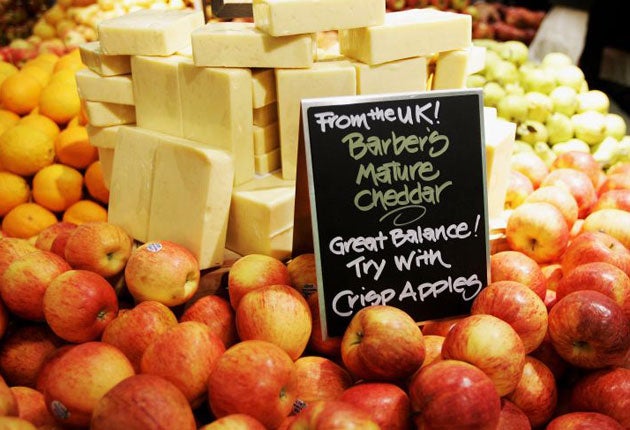Sales of organic food slump by up to 30 per cent
Supermarkets are the big losers as shoppers turn to box schemes and local shops for fresh produce

Demand for organic food has fallen faster than expected, according to new statistics about shoppers' habits. Consumers who were once prepared to pay a premium for organic produce are turning to cheaper alternatives, cutting sales by a fifth in the past year.
Although some decline was anticipated because of the recession, figures from the market research company TNS Worldpanel show that some foods have been hit hard within an overall 20 per cent drop in sales: organic bread has fallen by 31 per cent; fruit by 16.5 per cent and vegetables by 10 per cent. The company monitored the shopping habits of 25,000 households in the UK from February 2008 to February 2009.
Several of the big supermarkets confirm that some sales of organic produce have declined over this period. The Co-op said that organic meat fell by 12.5 per cent, and that sales as a whole had begun to decline since September. Tesco said: "Recently organics have declined slightly."
"A lot of this boils down to money," said Ed Garner, the communications director of TNS Worldpanel. "Premium food is under pressure and the ones that shout value are doing well. Many organic products are seen as too expensive."
As a further blow to organic producers, the category's share of the grocery market slipped from 1.4 per cent to 1.3 per cent, according to TNS Worldpanel. Justin King, the chief executive of Sainsbury's, said that customers were increasingly concerned with animal welfare and husbandry standards but organic food producers had not done a good job in communicating what it "stood for".
However, Bob Flowerdew, one of Britain's leading organic gardeners and a panel member on BBC Radio 4's Gardeners' Question Time, said that supermarkets were the big losers as people were returning to using local shops.
"Supermarkets don't offer much choice and often sell only the most expensive cuts as organic," said Mr Flowerdew. "People are realising that the internet, mail order and box schemes actually offer the best choice, freshness and value out there. It's insane to be flying stuff in that we could be growing ourselves."
In an attempt to keep the idea of sustainable consumption from collapsing in the recession, the Soil Association has helped to set up a programme encouraging people to grow their own organic food.
In the past 12 months it has helped 20 groups to set up what it calls community-supported agriculture, almost double the number set up in the previous year. The scheme involves people buying land either to farm themselves or paying a farmer to farm for them.
For a fixed fee they receive a portion of everything grown or reared on the land. Vegetables, fruit, livestock and wine are all being grown in this way.
One such scheme, the Headingley Pig Co-operative in Leeds, supplies 12 local families with pork every month. The farmer, Jo Cartwright, is paid up front, meaning she has guaranteed sales. Ms Cartwright also runs schemes for chicken and vegetables and has almost 90 customers in total. Members of the vegetable scheme help with weeding, planting and harvesting, which keeps costs down.
"I wish I could sell all my produce this way," said Ms Cartwright. "When I go to market I know that I'll sell my produce at a fair price. It guarantees that I'll always be able to pay for feed in advance, and means that I can plan for the future."
Register for free to continue reading
Registration is a free and easy way to support our truly independent journalism
By registering, you will also enjoy access to The Independent app, exclusive newsletters, commenting, and virtual events with our leading journalists.
By clicking ‘Create my account’ you confirm that your data has been entered correctly and you have read and agree to our Terms of use, Cookie policy and Privacy policy.
This site is protected by reCAPTCHA and the Google Privacy policy and Terms of service apply.
Already have an account?
By clicking ‘Register’ you confirm that your data has been entered correctly and you have read and agree to our Terms of use, Cookie policy and Privacy policy.
This site is protected by reCAPTCHA and the Google Privacy policy and Terms of service apply.
By clicking ‘Register’ you confirm that your data has been entered correctly and you have read and agree to our Terms of use, Cookie policy and Privacy policy.
This site is protected by reCAPTCHA and the Google Privacy policy and Terms of service apply.
Join our commenting forum
Join thought-provoking conversations, follow other Independent readers and see their replies
0Comments